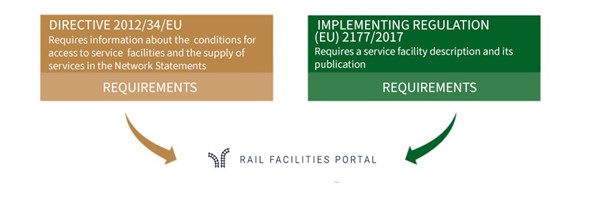In addition to its other functions, the RFP also helps all service facility operators to comply with their obligations resulting from Directive 2012/34/EU and Implementing Regulation (EU) 2177/2017.

Directive 2012/34/EU
Art. 27 and Annex IV stipulate that the Network Statements shall also contain information setting out the conditions for access to service facilities connected to the network of the IMs and for supply of services in these facilities or to indicate a website where such information is made available.
The RFP satisfies the requisites to become this website.
Implementing regulation (EU) 2177/2017
Art. 4 obliges operators of service facilities to establish a service facility description for the facilities and services for which they are responsible. The service facility description shall include at least the list of information set out in the abovementioned Article. A common template has been developed by the RNE Network Statement and Corridor Information Document Working Group together with the sector to facilitate the preparation of the service facility description.
One of the possibilities for operators of service facilities to make the above information available is to publish it on a common web portal and provide the IMs with a link to be included in the Network Statements. The RFP is the ideal common European web portal for this purpose since it is compliant with the Implementing Regulation as well as with the common template for service facility information.
Additionally, the Implementing Regulation also foresees that wherever technically possible with reasonable economic efforts, operators of service facilities shall make available real-time information on the service facility capacity and temporary capacity restrictions with major impact on the service facility’s operation using a common web portal. Including functionalities to fulfill these needs is subject to a feasibility study.